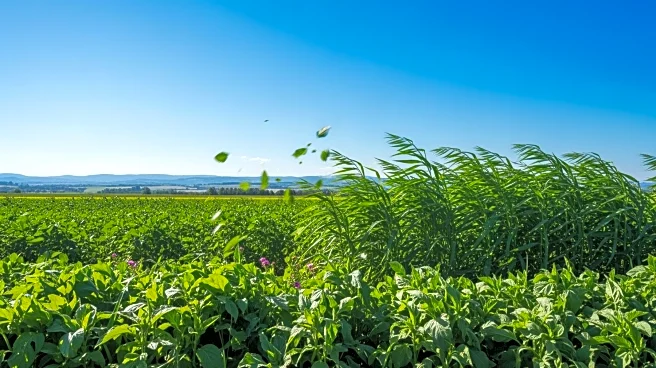What's Happening?
World Bank Group President Ajay Banga has commended Uttar Pradesh's innovative approach to agriculture, describing it as a global model for small and marginal farmers. During the AgriConnect Flagship event
at the World Bank's 2025 Annual Meetings, Banga praised the state's integration of technology with agriculture, which he observed firsthand during a visit in May. The Uttar Pradesh government has developed an agricultural ecosystem that incorporates climate adaptability from the outset, rather than as an afterthought. Banga highlighted the use of heat-tolerant seeds, soil-matched fertilizers, regenerative practices, efficient irrigation, and robust insurance and financing systems. These measures ensure that farmers are protected from the adverse effects of a single bad season. Digital technology plays a crucial role in this model, with AI tools and mobile phones assisting farmers in diagnosing crop diseases, guiding fertilizer use, issuing weather alerts, and facilitating secure digital payments.
Why It's Important?
The recognition of Uttar Pradesh's agricultural model by the World Bank underscores the potential for technology-driven solutions to address global agricultural challenges. This model offers a blueprint for other regions facing similar climate and agricultural issues, promoting sustainable farming practices that can enhance productivity and resilience. By integrating digital technology, the model empowers farmers with tools to make informed decisions, potentially increasing their income and reducing vulnerability to climate change. The World Bank's endorsement may encourage other governments and organizations to adopt similar strategies, fostering global collaboration in sustainable agriculture. This could lead to improved food security and economic stability for smallholder farmers worldwide.
What's Next?
The acknowledgment from the World Bank may lead to increased investment and support for Uttar Pradesh's agricultural initiatives, potentially expanding the model to other regions. Stakeholders, including governments and international organizations, might explore partnerships to replicate the model's success. This could involve scaling up technology integration and climate-resilient practices in agriculture globally. Additionally, ongoing monitoring and evaluation of the model's impact could provide valuable insights for further refinement and adaptation to different contexts. The focus on digital technology suggests continued innovation in agricultural tools and systems, enhancing the ability of farmers to respond to environmental challenges effectively.
Beyond the Headlines
The success of Uttar Pradesh's agricultural model highlights the ethical imperative of leveraging technology to address food security and climate resilience. It raises questions about the role of government and international bodies in supporting sustainable agriculture and the equitable distribution of technological resources. The model's emphasis on climate adaptability and digital integration may inspire broader discussions on the intersection of technology, sustainability, and social equity in agriculture. As climate change continues to impact global food systems, the model serves as a reminder of the need for proactive and inclusive approaches to agricultural development.









